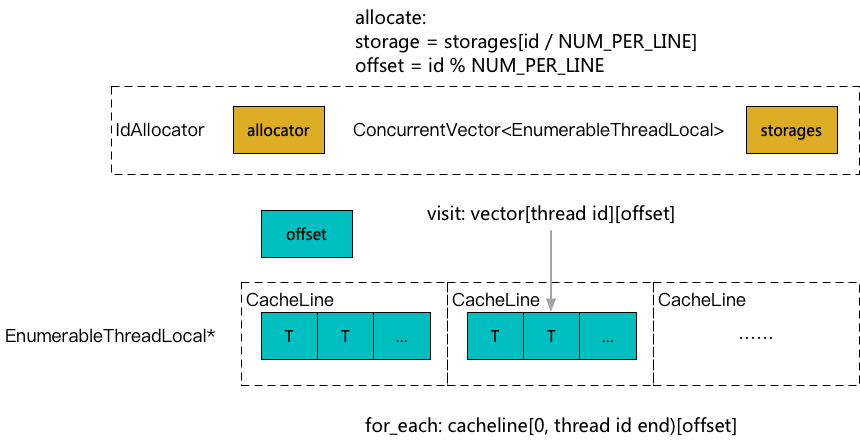babylon
Thread Local Storage
Principle
Thread Local Storage (TLS) mechanisms are often used as caches to accelerate high-concurrency operations. POSIX and compilers provide corresponding support, but each has its limitations:
- The
pthread_key_createmechanism is flexible but has a strict maximum limit, which can be restrictive in scenarios requiring a large number of TLS instances for acceleration. - Although the total number of
thread_localinstances is not limited, it must be determinable at compile time, which is not suitable for scenarios needing a dynamic number of TLS instances. - Both mechanisms lack traversal functionality, making them unsuitable for certain application scenarios.
To address these issues, EnumerableThreadLocal implements a TLS mechanism at the application level using vector and id_allocator. It mainly provides the ability to create an arbitrary number of instances dynamically and allows for efficient traversal.
EnumerableThreadLocal

CompactEnumerableThreadLocal

To efficiently implement TLS, it is often necessary to isolate data between threads by Cache Line. For a large number of small TLS instances (e.g., a size_t counter), this can lead to significant waste. CompactEnumerableThreadLocal reduces this waste by packing multiple small TLS instances together to share a single Cache Line.
Usage Example
EnumerableThreadLocal
#include <babylon/concurrent/thread_local.h>
using ::babylon::EnumerableThreadLocal;
// Define a type aggregator
EnumerableThreadLocal<size_t> storage;
// By default, there is no cache line isolation; you can implement it manually if needed
EnumerableThreadLocal<Aligned<size_t, 64>> storage;
// Get local data
// Thread 1
size_t& local_value = storage.local();
local_value = 3;
// Thread 2
size_t& local_value = storage.local();
local_value = 4;
// Aggregate all local data
size_t sum = 0;
storage.for_each([&] (size_t* begin, size_t* end) {
while (begin != end) {
sum += *begin++;
}
});
// sum = 7
// When Thread 2 exits
// Aggregate all local data again
size_t sum_all = 0;
size_t sum_alive = 0;
storage.for_each([&] (size_t* begin, size_t* end) {
while (begin != end) {
sum_all += *begin++;
}
});
storage.for_each_alive([&] (size_t* begin, size_t* end) {
while (begin != end) {
sum_alive += *begin++;
}
});
// sum_all = 7, sum_alive = 3
CompactEnumerableThreadLocal
#include <babylon/concurrent/thread_local.h>
using ::babylon::CompactEnumerableThreadLocal;
// Define a type aggregator
// The template parameter specifies how many cache lines a block contains; in scenarios where many instances need to be created,
// More cache lines will make memory more compact and speed up dense traversal
CompactEnumerableThreadLocal<size_t, 1> storage;
// Get local data
// Thread 1
size_t& local_value = storage.local();
local_value = 3;
// Thread 2
size_t& local_value = storage.local();
local_value = 4;
// Aggregate all local data
size_t sum = 0;
storage.for_each([&] (size_t& value) {
sum += value;
});
// sum = 7